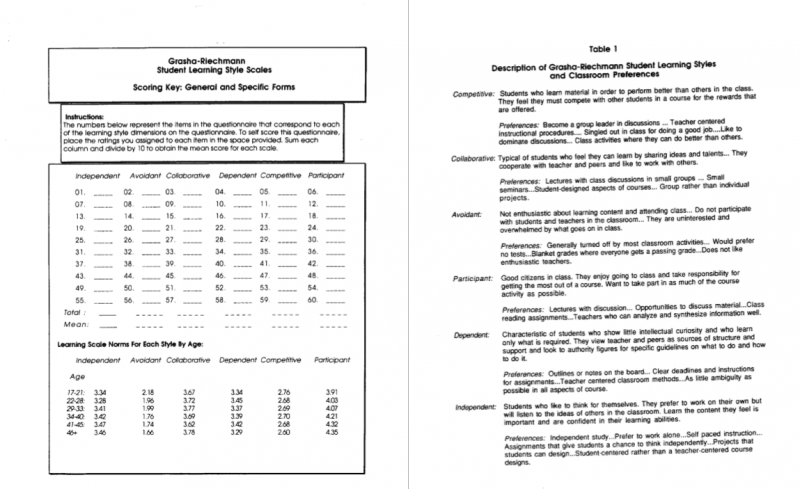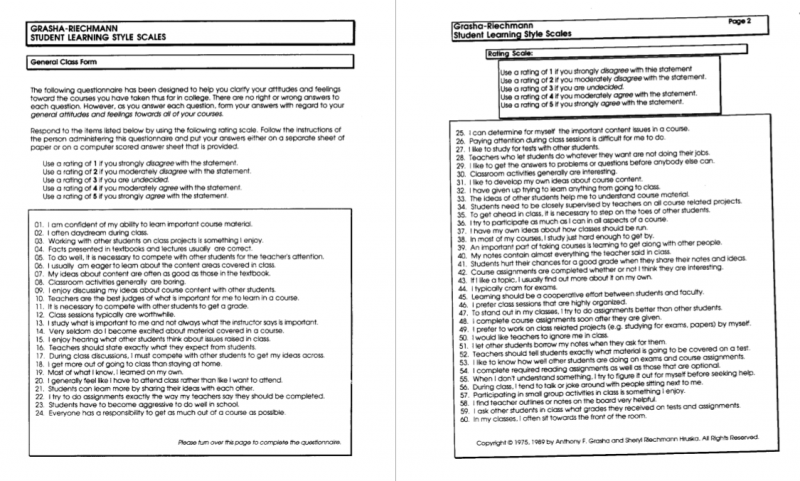The Grasha-Riechmann Student Learning Styles Scale
Introduction
Studies in learning styles initially developed as a result of interest in individual differences. These issues were very much in vogue within investigatory psychology during the 1960's, enjoyed a continuing popularity during the early 1970's but have unfortunately past from vogue since then due to our society's changed focus or an evolution of professional interest. (Curry, 1983)
What is Learning?
Curry (1983) states that learning is both a process and a product.
“The process is adaptive, future focused; and holistic; affecting an individual's cognitive; affective; social, and moral volitional skills.
The product is observable as a relatively permanent change in behaviour, or potential behaviour.
The process is observable in the improved ability of the individual to adapt to environmental stimuli.”
A literature review by Curry of 46 citations of various concepts of learning styles in general education, and 16 additional citation in education profession, indicated….
“when positive results are found they generally indicate that student learning can be improved by tailoring instructional Modality as much as possible to each student's preference or style” (Curry, 1983)
King (2011) in his article highlights that “There is a significant body of literature that suggests that different students have different styles of learning in which they learn more effectively” and outlines how cultural differences can play a part in learning styles and that “if there is a mismatch between the teaching style of the teacher and the learning style of the student then the teaching/learning process can be less effective” (King, 2011).
Learning Styles.
A learning style can be defined as the application, within a learning situation, of an individual’s typical mode of problem solving, thinking, perceiving and remembering (Cassidy, 2004), good overviews of the literature can be found in Cassidy (2004) and Swanson (1995) and is not the intention to review and research these in detail but to look at the work of Grasha-Riechmann.
It focuses on students’ interactions amongst their peers, the instructors, and learning in general. The GRSLSS also has a teaching styles survey that instructors can complete to see how their instruction matches or conflicts with their learners so they can adapt and diversify to meet more learner’s needs, which is an interesting area for future study. The learning styles scale itself consists of six primary learning styles, a variety of which are present in each learner, though to varying degrees.
The six learning styles are:
- Avoidant,
- Collaborative,
- Competitive,
- Dependent,
- Independent, and
- Participant.
The survey itself consists of 60 items, with ten questions each that are averaged together to measure dominance in one or more of the six measured learning styles. (Lewis, 2014)
The Grasha-Reichmann model focuses on student attitudes toward learning, classroom activities, teachers, and peers; rather than studying the relationships among methods, student style, and achievement, Grasha and Reichmann emphasize the increased ability to problem-solve, communicate with others, and organize materials.
Learning Styles Diagnostic and Suggested Preferences.
- Competitive.
Students who learn material In order to perform better than others in the class. They feel they must compete with other students in a course for the rewards that are offered. Preferences: Become a group leader in discussions... Teacher centered instructional procedures... Singled out in class for doing a good job... Like to dominate discussions... Class activities where they can do better than others. - Collaborative.
Typical of students who feel they can learn by sharing ideas and talents... They cooperate with teacher and peers and like to work with others. Preferences: Lectures with class discussions in small groups... Small seminars... Student-designed aspects of courses... Group rather than individual projects. - Avoidant.
Not enthusiastic about learning content and attending class... Do not participate with students and teachers in the classroom... They are uninterested and overwhelmed by what goes on in class. Preferences: Generally turned off by most classroom activities... Would prefer no tests... Blanket grades where everyone gets a passing grade...Does not like enthusiastic teachers. - Participant,
Good citizens in class. They enjoy going to class and take responsibility for getting the most out of a course. Want to take part in as much of the course activity as possible. Preferences: Lectures with discussion... Opportunities to discuss material... Class reading assignments... Teachers who can analyse and synthesize information well. - Dependent.
Characteristic of students who show little intellectual curiosity and who learn only what is required. They view teacher and peers as sources of structure and support and look to authority figures for specific guidelines on what to do and how to do it. Preferences: Outlines or notes on the board... Clear deadlines and instructions for assignments... Teacher centered classroom methods... As little ambiguity as possible in all aspects of course. - Independent.
Students who like to think for themselves.They prefer to work on their own but will listen to the ideas of others in the classroom. Learn the content they feel is important and are confident in their learning abilities. Preferences: Independent study... Prefer to work alone... Self paced instruction... Assignments that give students a chance to think independently... Projects that students can design... Student-centered rather than a teacher-centered course designs.
References
- Cassidy, S. 2004 Learning styles: An overview of theories, models, and measures, Educational Psychology,24(4), 419-444
- Curry, A., 1983. An Organization of Learning Styles Theory and Constructs. American Educational Research Association , pp. 1-25.
- King, A., 2011. Culture, Learning and Development: A Case Study on the Ethiopian Higher Education System.
- Lewis, M. A., 2014. Learning Styles, Motivations, and Resource Needs of Students, s.l.: Chapel Hill, North Carolina.
- Markus, H.R. & Kitayama, S., H. R. & Kitayama, S., 1991. Culture and the self: implications for cognition, emotion and motivation.. Psychological Review, Volume 2, p. 98.
- Grasha-Riechmann Student Learning Style Scales
- Swanson, L.J. 1995 Learning styles: A review of the literature, Educational Research Information Centre document no. ED 387 067








